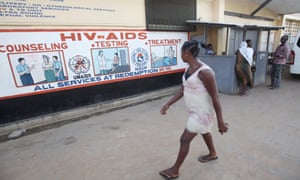Efforts to combat Aids in Africa are seriously faltering, with drugs beginning to lose their power, the number of infections rising and funding declining, raising the prospect of the epidemic once more spiralling out of control, experts have warned.
The UN has set a target of 2030 for “the end of Aids”, which has been endorsed by donor governments including the US, where the president, Barack Obama, said the end was in sight last month.
Related: Think the Aids epidemic is over? Far from it – it could be getting worse | Sarah Boseley
But the reality on the ground, especially in the developing world, looks very different. Many experts believe that the epidemic will continue to spread and the Aids death toll, still at 1.5 million people a year, could begin to soar again.
Prof Peter Piot, the first executive director of UNAIDS and director of the London School of Hygiene and Tropical Medicine, told the Guardian: “I don’t believe the slogan ‘the end of Aids by 2030’ is realistic and it could be counterproductive. It could suggest that it’s fine, it’s all over and we can move to something else. No. Aids is still one of the biggest killers in the world.”
At the recent International Aids Conference in Durban, South Africa, Bill Gates, a self-proclaimed optimist whose foundation has invested heavily in combatting HIV, warned of trouble ahead.
“If we only do as well as we have been doing, the number of people with HIV will go up even beyond its previous peak,” Gates said. “We have to do an incredible amount to reduce the incidence of the number of people getting the infection. To start writing the story of the end of Aids, new ways of thinking about treatment and prevention are essential.”
Those fighting the epidemic face a devastating combination of problems:
- Every year, around the world, nearly 2 million people, 60% of them girls and young women, become newly infected with the virus, despite prevention efforts.
- In developing countries, HIV is becoming resistant to the drugs used to treat people and keep them well, which means they will increasingly need other drugs that are currently unaffordable.
- Donor countries are cutting back on funding.
Globally, 38 million people are living with HIV, 17 million of whom are now on drugs that stop them transmitting the virus to others. But the rise in infections appears inexorable.
Piot said: “It is as if we’re rowing in a boat with a big hole and we are just trying to take the water out. We’re in a big crisis with this continuing number of infections and that’s not a matter of just doing a few interventions.”

There had been hope that treating people would stop the spread, but studies are beginning to show that “test and treat” – putting people on drugs as soon as they test positive for HIV to prevent them being infectious – may not work. Many people do not want to take medication until they become ill. Piot believes that drugs will not stop Aids and that cultural change, which is far harder to bring about, will be necessary.
“We will not end HIV as an epidemic just by medical means,” he said. “People are not robots. Sex happens in a context. It is about power. Southern African girls and young women are infected by men who are much older than themselves. It’s about poverty. It’s also about a culture of machismo. There are also gay men all over the world who are discriminated against and underground, and there’s no way you can prevent infections if something is underground.”
Gates said the number of young people at risk in Africa is set to rise markedly. In a few decades, 40% of the world’s youth will live on the continent.
Related: It isn’t lack of drugs preventing us eradicating Aids, but inequality | Lilianne Ploumen
“The largest generation in history is entering an age where they are most at risk … In 1990, there were 94 million people between the ages of 15 and 24. Already, that number has doubled. By 2030, [there will be] more than 280 million young people. The vulnerable age group will be three times as large in 2030 as it was back in 1990,” he said.
Drug resistance is only now beginning to be monitored in Africa, but there are clear signs that it is growing. Médecins Sans Frontières has found 10% resistance in its projects.
A report for the World Health Organisation by Michael Jordan of Tufts University in Massachusetts tells of 40% resistance to one of the crucial drugs in the basic cocktail given to people in less economically developed countries. Resistance is widespread in Europe and North America, but people with HIV are moved on to newer drug combinations that are vastly more expensive. The basic regime in Africa costs $ 100 (£75) a year. Drug treatments in the US cost more than $ 20,000 a year.
Jordan’s report shows that more than one-third (35.7%) of nearly 1,200 clinics reported regularly running out of at least one drug over the course of a year. If antiretroviral drugs are not taken consistently, the virus mutates, resistance develops and the drug will no longer work. It also found that one in five patients was lost to followup, so nobody knows whether they are being successfully treated.
Funding for HIV is declining, in response to austerity measures, financial crises and the assumption that the epidemic is under control. A recent report from the Kaiser Family Foundation and UNAIDS said funding from donor governments fell last year for the first time in five years, from $ 8.6bn in 2014 to $ 7.5bn.
Hope for "end of Aids" is disappearing, experts warn
Hiç yorum yok:
Yorum Gönder